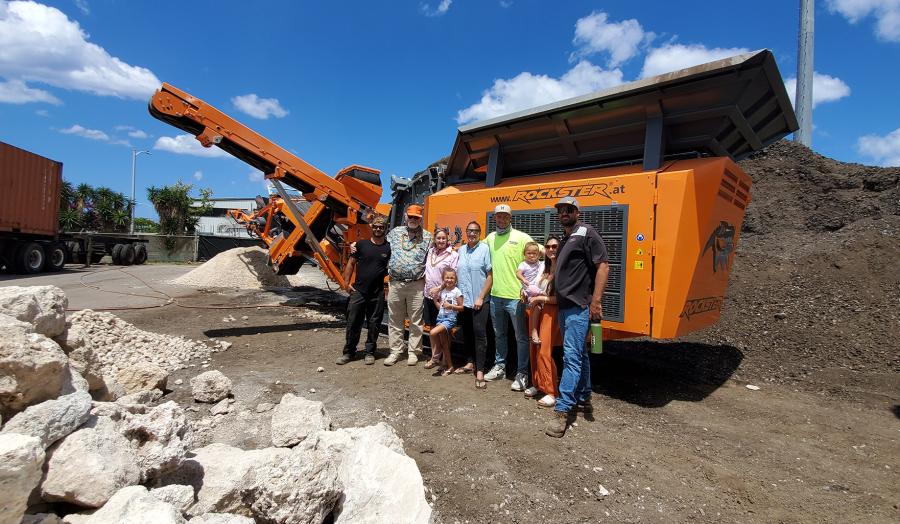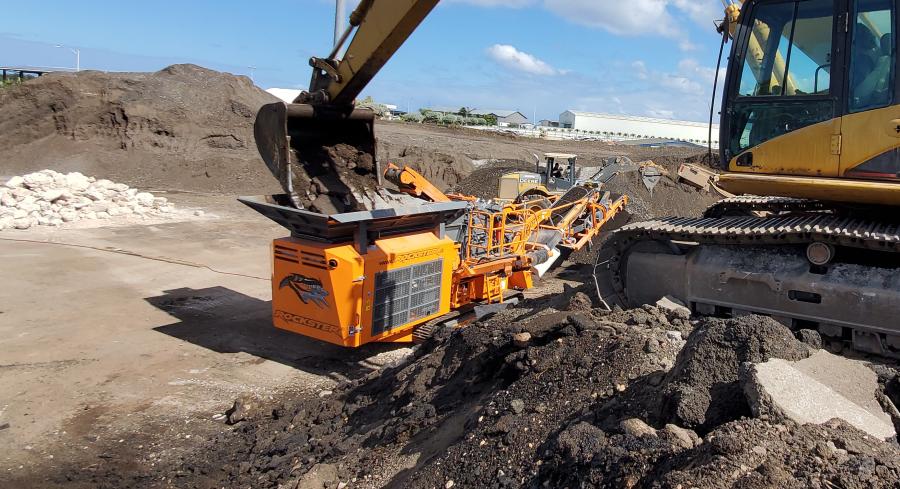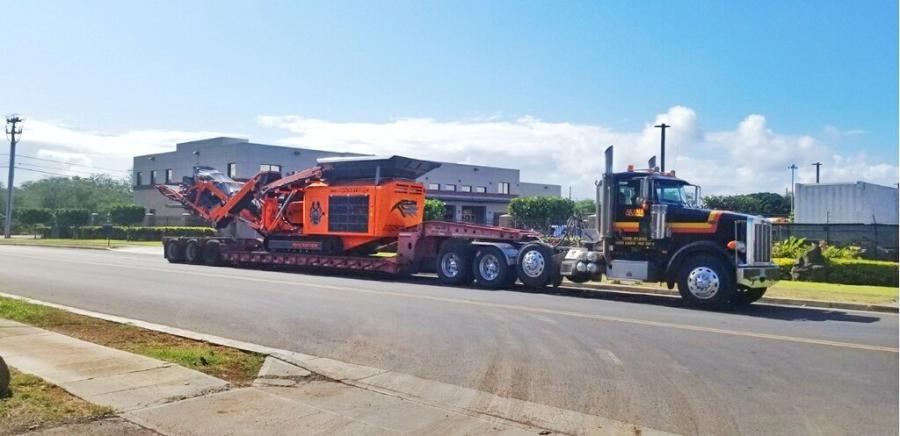Crushing coral with the Rockster R700S impactor on a 3-acre processing yard from Alakona Corp in Honolulu. with the Pacific Ocean in the background. Final fractions 1 ½-3 in. and 1 ½ in. minus.
After a long cruise over the Atlantic Ocean through the Panama Canal, and across the Pacific, Rockster's mobile impact crusher R700S reached Hawaii — more precisely the island of Oahu.
Arist de Wolff and his team of 25 motivated employees were very excited about the arrival of their brand new Austrian crushing plant. Alakona Corp., founded in 1982 by de Wolff's father Mervyn de Wolff, is an asphalt paving and paving maintenance contracting firm, situated in the Hawaiian capital, Honolulu.
Alakona Corp serves Oahu and the neighbor islands, with a wide list of clients that includes federal, state, city and county governments, commercial enterprises, developers, property managers, condominium associations and individual owners.
At the very beginning, Alakona Corp focused on pavement maintenance with emphasis on slurry seal, seal coating and minor asphalt repairs. During the recent years the company has moved toward its present service/product mix, deriving its income from asphalt repair, asphalt overlay, new asphalt lay, pavement maintenance, as well as slurry seal, seal coat and crack fill.

A very successful family business: FLTR – Operator Jon Keck, Owners Mervyn de Wolff, Betsy Wilson, Max de Wolff and Arist de Wolff with his wife and their two girls.
Alakona's Perfect Crusher is Designed, Produced in Austria
Alakona owns several machines it needs for its core business, like pavers, rollers, loaders, excavators, slurry and seal coat applicators. When it searched for a crusher to expand its business, it put its focus on compact machinery below 25 tons, which exactly fits its fleet.
"We feel that Austrian engineers are really honest. Wolfgang Kormann explained in detail how the machine could be beneficial to us and it is true. We are so flexible in terms of processing different aggregates and the material we produce with our crusher is of high value. We do also like the fact that the return belt can be turned aside, and we can make another fraction, as well as the fine side belt that can be pulled off.
"The screen box is also very beneficial as it allows us to produce different material sizes by just switching some screens. There are some options that others don't have, and we are very enthusiastic about the hydrostatic drive", said Arist de Wolff.
Due to this drive system, the performance of the R700S is constantly high, as the hydrostatic pressure always adjusts to the power requirements of the crusher, de Wolff added. This leads to a lower diesel consumption per ton of production because the diesel engine always stays within the optimum speed range.

Currently, Alakona crushes approximately 5,511 tons a month with the R700S impactor.
The New Line of Business: Processing of RAP
It was a logical step for Alakona to put emphasis on a recycling business.
"Obviously, natural rock isn't gonna be there forever, in future we would have to ship it in from the mainland. Sustainability is the key factor. We need a lot of material for subbases, base coarse or backfills. Using reclaimed asphalt pavement instead of natural aggregate saves resources and money. Moreover, RAP contains a bit of bitumen, it is like a glue, holding everything together and giving more compaction", said de Wolff.
Using the attached screening system, Alakona crushes asphalt from 1 ½ to 2 in. to 1 ½ in. minus of a final size material.
"We're doing a bunch of tests like the CBR, to make sure the final material is suitable for reuse in our construction projects," he added.
The Californian Bearing Ratio (CBR) test is a penetration test used to evaluate the subgrade strength of roads and pavements.

The R700S weighs 50,300 lbs. with screen box and return belt, which can be easily transported with Alakona's own truck.
Ever Heard of Coral Crushing?
Another material that Alakona processes with the new Rockster crusher is coral. In Hawaii you find a lot of coral shells underneath the soil. So, when Alakona works on street construction sites close to the ocean they usually excavate coral. Without a screening system, they run a 3 in. minus final product, used mostly for landscaping.
"We like the possibility to use the stockpile belt to get another fraction. Especially for processing coral, we run a 2 to 3 in. coarse aggregate from the side belt and 1 ½ in. minus from the screen. Coral is quite a hard rock with high density. The crushed material contains less fines than the crushed asphalt. We can use it as base coarse for house or concrete paths", de Wolff said.

Alakona Corp from Honolulu relies on a high-quality Austrian crusher brand to process RAP and coral with its new R700S Rockster portable crushing plant.
Easy Transport Facilitates Entry in Contracting Business
With a screen box and return belt, the Rockster R700S weighs only 50,300 lbs. (22.8 tons) and can be easily transported with Alakona's own flatbed truck without the need of transport permits. This gives great flexibility in terms of future plans, to get a foot in the door of contracting business. It also saves a lot of time and money.
"We are able to crush so many kinds of material. Within four days of training this summer, we crushed RAP, coral, concrete and basalt. There are so many possibilities for a lot of different customers like construction companies, privates and of course municipalities. You would think that people on an island would be more aggressive into researching, testing and using recycled material, but they are hesitant in trying new things. It needs to be pushed more and people need to understand that this is the future. There needs to be recycled material especially in construction fields where we could save so much natural resources," de Wolff said.
For more information, visit www.rockster.at.
This story also appears on Aggregate Equipment Guide.
Today's top stories




















